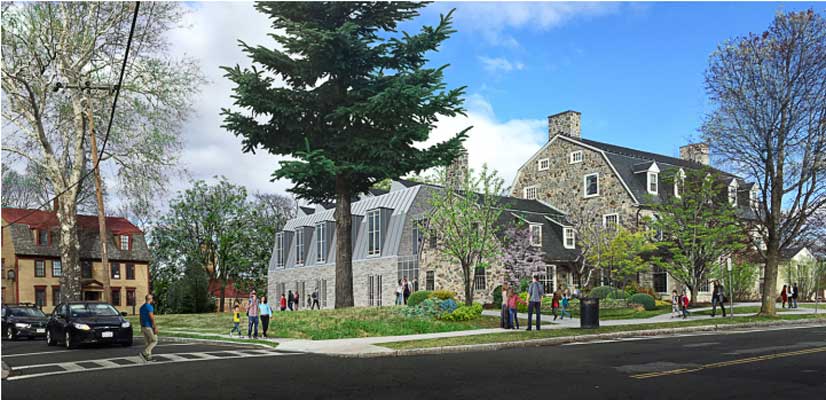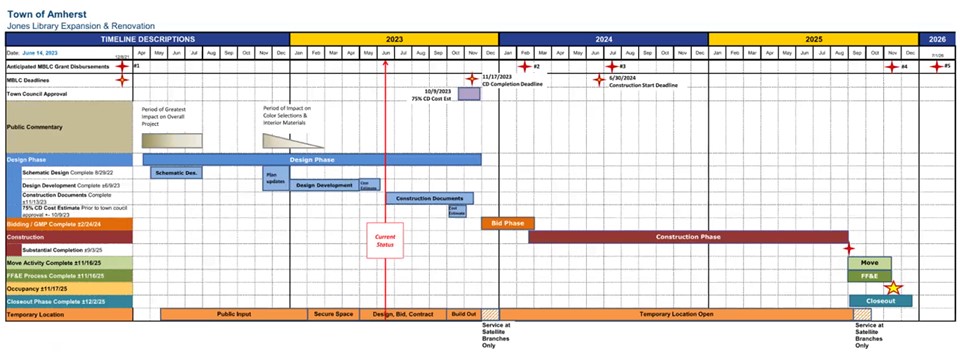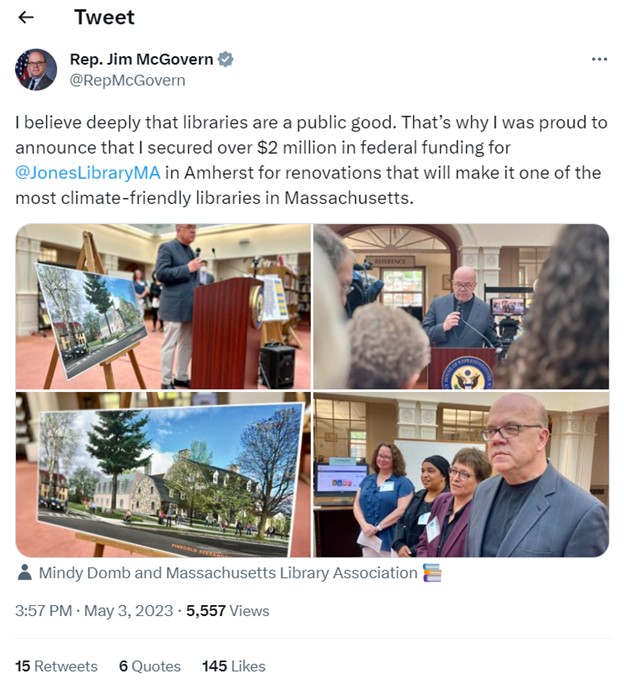Library Project Shuns State Energy Code. Building Inspector Explains The Rules

Photo: https://www.joneslibrary.org/
Jones Renovation-Expansion Maneuvers To Claim Exemption From New Mass. Energy Code
Recent Jones Library Building Committee (JLBC) meetings have made subtle reference to the urgent need to push through the renovation-expansion project’s building permit in order to avoid having to comply with an update to the Massachusetts Energy Code which goes into effect this weekend (July 1, 2023).
The subject was first raised at the June 8 JLBC meeting by Owner’s Project Manager (OPM) Tim Alix of Colliers Project Leaders. The meeting was held in the Library’s Woodbury Room, with no public remote access enabled and no video of the proceedings recorded. The question of energy code compliance was not noted on the published agenda. Without identifying the new state code as relating to energy efficiency requirements, Alix reported the desire to get the project permitted before “the new code comes out.” JLBC members, including Town Manager Paul Bockelman and Finance Director Sean Mangano who are charged with ensuring that building project plans maintain the value expected for the Town’s $36.3 million appropriation, asked no questions and raised no objections. The meeting minutes distributed by Library Director Sharon Sharry made no mention of the OPM’s comment except to list permitting as an additional approval needed.
The lack of adherence to state energy efficiency standards represents a departure from the building project’s earlier sustainability goals. During past cost-cutting sessions, JLBC Chair Austin Sarat warned that significant tax, gift, and grant money has been committed on the promise of dramatic sustainability improvements.
Energy Code Requirements Have Been Known Since 2022
The efficiency requirements that the JLBC is looking to avoid are spelled out in 225 CMR 23 Massachusetts Commercial Stretch Energy Code 2023. The latest revisions were published in a technical guidance document by the Mass. Dept. of Energy Resources (DOER) in December 2022.
The new code – both a version for residential buildings that went into effect on January 1. 2023 and the section for commercial buildings which becomes law on July 1, 2023 – represents an effort by the DOER to keep Massachusetts moving toward its Global Warming Solutions Act of 2008 goal of reducing greenhouse gas emissions 80% below 1990 levels by 2050.
In January the Boston Society for Architecture published a detailed presentation describing the changes in the new stretch energy code.

The Jones Library building project schedule shows the design development phase running from January to June 2023. On June 15 the JLBC voted to enter the Construction Documents preparation phase.
Amherst’s other major capital investment, construction of a new Fort River Elementary School, has invested substantial effort into meeting the new energy stretch code. The school project’s Sustainability Committee has reported embracing the new Thermal Energy Demand Intensity (TEDI) analysis requirements embodied in the 2023 code. Working with the DOER on design models, the project’s engineering consultants Thornton Tomasetti succeeded in achieving 2023 energy code TEDI targets of 2.2 kBtu/sf/yr for heating and 13.6 kBtu/sf/yr for cooling.

Recognizing climate action as one of Amherst’s core values, Town Councilor Ana Devlin Gauthier proposed at the June 26 council meeting that the town move beyond its current “Stretch Energy Code” to the “Specialized Opt-In Energy Code,” a feature of the state’s new building energy code. Such a change would impose even more stringent energy efficiency requirements than those that the JLBC is looking to avoid.
Building Inspector Rob Morra Weighs In
Amherst Building Inspector Robert Morra has responded to several questions about the building permit process posed by The Amherst Indy.
[Indy] Is it possible for this (or any building) to avoid the new stretch code by filing for a permit before July 1? We understand the new elementary school is modifying the design to comply.
[Morra] Building permit applications received on or after July 1, 2023 will be required to comply with the updated stretch code for commercial buildings. Applications filed this week [of June 26, 2023] will not be required to comply with the updated code provided the applications are complete and a building permit is issued after review.
[Indy] At what point in the design process are permit applications generally submitted? Must detailed construction designs be completed before the application is submitted?
[Morra] This will vary depending on the build approach. However, detailed construction plans and specifications are required for any addition, alteration or new construction.
[Indy] Must there be a construction contract in place before a permit can be issued?
[Morra] No.
[Indy] What is the procedure for approving the project? What is submitted and how are decisions made? Who makes the decisions. Will the Jones project need to go before the Planning Board as the North Amherst Library renovation did?
[Morra] Permit applicants will work with our Permit Administrator to file the application. Once all required documents are received – application, plans, specifications, licenses, insurances, etc., the application moves along in the process to a building inspector for technical review. This review includes both code and zoning review including confirming that any land use permit conditions are satisfied. This step in the process also includes other departments and town officials as applicable to the project. The final decision to issue a building permit is made by a building inspector. Yes, the Jones Library project will require a land use permit and review by the Planning Board.
Town Planning Director Christine Brestrup has confirmed that the Jones Library Building Project will not be issued a building permit until it has undergone Design Review Board review, Historical Commission review, and a Planning Board Site Plan Review.


Secret meetings with published minutes? The Jones Library Building Committee’s drive to push through its project before needed environmental regulation reeks of desperation and bad faith. Sold to the public and our elected representatives as “one of the most climate-friendly libraries in New England,” we are now presented with a brazen maneuver by a Committee determined to push its pet project forward before needed environmental regulations go into effect, and without regard to the town’s actual needs, its financial capacity, or the climate catastrophe around us.
None of this is what we were told; this is not what we voted for in referendum. Should the JLBC truly believe that, notwithstanding past mendicity, its project can bear serious scrutiny, it should go back to the public for a vote, an honest vote on the actual project at actual cost and actual climate damage. Because decent government requires honesty, transparency, and no bait-and-switch.
It was a hot, humid afternoon, and as I was reading this piece (and the good comments), I must have landed in the land of…oz…oz…oz…oz…oz…oz….
When a future user of “The New Jones” asks its reference librarian for directions to the absolutely-essential (though yet-to-be-planned*) PUBLIC SERVICE SCANDALS READING ROOM, where the Chronicle of Corruption will be shelved, the monumental “B as in Bell” tome** may struggle to compete for space with the
ever-thickening*** “A as in Amherst” volume.
But wouldn’t it be nice if we could simply slip behind the curtain to discover that the “The New Jones” was merely a collective figment**** of “The Wizards of Jones” imaginations?
=====================================================
Footnotes:
*At least as far the public knows….
**Herewith (and therein) are some sources for the “B as in Bell” tome:
https://en.wikipedia.org/wiki/City_of_Bell_scandal
https://digitalcommons.chapman.edu/localgovernmentreconsidered/bellscandal/
***Likewise, Jeff’s thoughtful reporting in The Indy will prove fundamental for
understanding the belt-busting Jones Library demolition/expansion project.
****Wouldn’t it be grewat if the Town Manager just click his “ruby-slippered heels” together before it’s too late?!?!